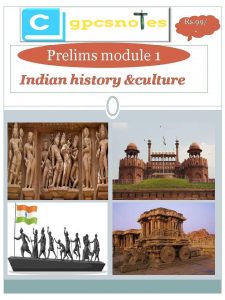History has always been a major portion in CGPCS Exams, weather it be Prelims Exam or Mains Exam. We have Bifurcated the History into following topics for the systematic study for CGPCS Exam by our students.
History plays a crucial role in not only CGPCS Prelims Exam but even CGPCS Mains Exam. History Notes are designed by Chhattisgarh PCS Toppers and other civil servants. Detail Notes can be browsed at the following links
Detailed Notes for History
Specifically designed Notes for History can be Bought at minimum price in PDF or Printed format
Who were the early inhabitants of Chhattisgarh?
The early inhabitants of Chhattisgarh were tribal communities, primarily the Gonds, who established powerful kingdoms in the region. Evidence of their presence can be found in the rock paintings and archaeological sites in the region.
What are the major historical kingdoms and dynasties that ruled Chhattisgarh?
Some of the prominent kingdoms and dynasties that ruled Chhattisgarh include:
- The Satavahanas: (2nd century BCE to 3rd century CE) – Their rule is evidenced by coins and inscriptions found in the region.
- The Nalas: (5th to 6th century CE) – Known for their contribution to art and architecture, especially the Rajim temples.
- The Sarabhapuriyas: (6th to 9th century CE) – Established their capital at Sharabhapura (modern-day Sirpur).
- The Somavamshis: (10th to 12th century CE) – Their rule saw the flourishing of art and culture, with Sirpur being a major center of Buddhist learning.
- The Kalachuris of Tripuri: (10th to 14th century CE) – Known for their architectural marvels like the Bhoramdeo Temple.
- The Marathas: (18th to 19th century CE) – Briefly ruled over the region before the advent of British rule.
What was the significance of Sirpur in ancient Chhattisgarh?
Sirpur, located on the banks of the Mahanadi River, was a major center of Buddhist learning and culture during the 6th to 8th centuries CE. It was an important city under the Sarabhapuriya and Panduvamsi dynasties. The archaeological excavations at Sirpur have unearthed several Buddhist monasteries, temples, and stupas.
How did the British establish their rule in Chhattisgarh?
The British gradually established their control over Chhattisgarh in the 19th century through a series of military conquests and treaties with local rulers. The region was initially part of the Central Provinces and Berar and later became a separate province in 1904.
What was the role of Chhattisgarh in the Indian independence movement?
A: Chhattisgarh actively participated in the Indian independence movement. Several leaders and revolutionaries from the region, such as Veer Narayan Singh, Pt. Sundarlal Sharma, and Pt. Ravishankar Shukla, contributed significantly to the freedom struggle.
When did Chhattisgarh become a separate state?
Chhattisgarh was carved out of Madhya Pradesh and became a separate state on November 1, 2000.
Who was the first Chief Minister of Chhattisgarh?
The first Chief Minister of Chhattisgarh was Ajit Jogi, who served from 2000 to 2003.
What are some important events in the post-independence history of Chhattisgarh?
Some important events include:
- The Naxalite insurgency: The state has been affected by Naxalite insurgency, which has posed a significant challenge to its development and security.
- Economic development: Chhattisgarh has witnessed substantial economic growth since its formation, driven by mining, industrialization, and agriculture.
- Social development: The state has made progress in various social indicators, such as literacy and healthcare.
